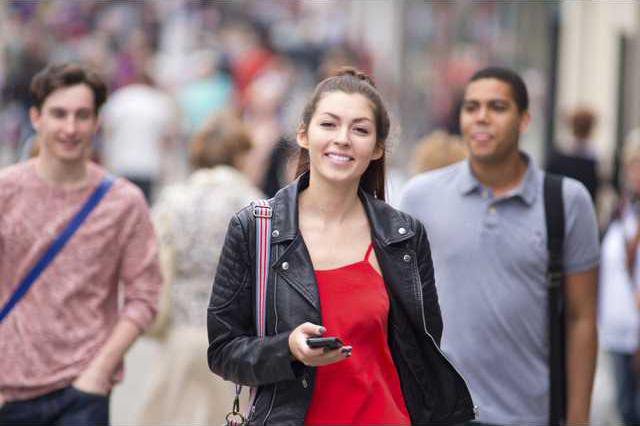You dont have to know a person to brighten his life. You have the power to bless a perfect stranger through your actions. Just pay attention.
Use these few simple actions to brighten someone's life, and you'll find you've brightened your own. It's automatic. You cant shut it off. And why would you want to? Isnt happiness your major goal in life?
1. Look a stranger in the eyes and smile. We dare you.
The price of a smile is free. Seeing someone smile at you in a busy grocery store, a doctors office anywhere, really is like a light being turned on in a dark room. Almost always, the stranger you smile at smiles back at you. And even if he doesnt, your happy gesture will linger in his mind.
Try it. It makes you feel good.
What sunshine is to flowers, smiles are to humanity. These are but trifles, to be sure; but scattered along lifes pathway, the good they do is inconceivable.
-Joseph Addison
2. Leave a note of encouragement
You may never know who receives your note, but you will definitely leave an impression.
An immigrant woman from Zimbabwe suffered so much deprivation and unhappiness in her childhood that she was determined to help others experience a little joy in their lives; however, financial limitations made this hard...
Thats when the idea of writing kind notes popped into my head little letters left in random places such as post boxes, traffic lights, library books, vending machines, parking meters, supermarkets, music concerts, everywhere really.
Her main motive with each letter? Inject some unexpected happiness into someone elses day whether a short message like have a great day," a longer, more detailed message, or a small bouquet of roses left on the hood of a car with a note: Beauty is being yourself. Be yourself always.
3. Donate your unused clothes
Most of us have more clothes than well ever need. These extra duds just hang in our closets with nowhere to go. Take a few minutes to go through your closet and take unused items to your local charity.
Recently, a woman who had searched everywhere for a particular shirt stopped, on a whim, at a used items location. To her surprise, she found not only one but two shirts that were exactly what she was looking for. She said, It made my day! Now thats putting a smile on a stranger's face.
4. Compliment your waiter
The next time you go out to eat, thank your waiter and be specific. You took great care of us. Thanks for noticing when our drinks were low and for getting things out so quickly.
Or how about thanking the chef? I remember when my husband asked the waiter if he could talk to the chef an unusual request. The chef came out, and as he wiped his hands on a towel, my husband said, This is one of the best meals weve ever had. Thank you for creating this delicious dinner for us. The chef was so surprised, thanking my husband profusely. Too many people go unappreciated. Change that.
Opportunities abound
There are many more ideas for bringing happiness to strangers. When you bring joy into the lives of others, your own life cannot help but be blessed.
The best way to cheer up yourself is to try to cheer someone else up.
-Mark Twain
And it's true. Give it a try today, and watch the smiles appear. Youll be sure to see them on the faces of strangers all over the place, but none quite as bright as the face in your mirror.
For more from the Lundberg's, see their 99 cent e-books: "Wake-up Call What Every Wife Needs to Know" and "What Every Husband Needs to Know."
Use these few simple actions to brighten someone's life, and you'll find you've brightened your own. It's automatic. You cant shut it off. And why would you want to? Isnt happiness your major goal in life?
1. Look a stranger in the eyes and smile. We dare you.
The price of a smile is free. Seeing someone smile at you in a busy grocery store, a doctors office anywhere, really is like a light being turned on in a dark room. Almost always, the stranger you smile at smiles back at you. And even if he doesnt, your happy gesture will linger in his mind.
Try it. It makes you feel good.
What sunshine is to flowers, smiles are to humanity. These are but trifles, to be sure; but scattered along lifes pathway, the good they do is inconceivable.
-Joseph Addison
2. Leave a note of encouragement
You may never know who receives your note, but you will definitely leave an impression.
An immigrant woman from Zimbabwe suffered so much deprivation and unhappiness in her childhood that she was determined to help others experience a little joy in their lives; however, financial limitations made this hard...
Thats when the idea of writing kind notes popped into my head little letters left in random places such as post boxes, traffic lights, library books, vending machines, parking meters, supermarkets, music concerts, everywhere really.
Her main motive with each letter? Inject some unexpected happiness into someone elses day whether a short message like have a great day," a longer, more detailed message, or a small bouquet of roses left on the hood of a car with a note: Beauty is being yourself. Be yourself always.
3. Donate your unused clothes
Most of us have more clothes than well ever need. These extra duds just hang in our closets with nowhere to go. Take a few minutes to go through your closet and take unused items to your local charity.
Recently, a woman who had searched everywhere for a particular shirt stopped, on a whim, at a used items location. To her surprise, she found not only one but two shirts that were exactly what she was looking for. She said, It made my day! Now thats putting a smile on a stranger's face.
4. Compliment your waiter
The next time you go out to eat, thank your waiter and be specific. You took great care of us. Thanks for noticing when our drinks were low and for getting things out so quickly.
Or how about thanking the chef? I remember when my husband asked the waiter if he could talk to the chef an unusual request. The chef came out, and as he wiped his hands on a towel, my husband said, This is one of the best meals weve ever had. Thank you for creating this delicious dinner for us. The chef was so surprised, thanking my husband profusely. Too many people go unappreciated. Change that.
Opportunities abound
There are many more ideas for bringing happiness to strangers. When you bring joy into the lives of others, your own life cannot help but be blessed.
The best way to cheer up yourself is to try to cheer someone else up.
-Mark Twain
And it's true. Give it a try today, and watch the smiles appear. Youll be sure to see them on the faces of strangers all over the place, but none quite as bright as the face in your mirror.
For more from the Lundberg's, see their 99 cent e-books: "Wake-up Call What Every Wife Needs to Know" and "What Every Husband Needs to Know."








